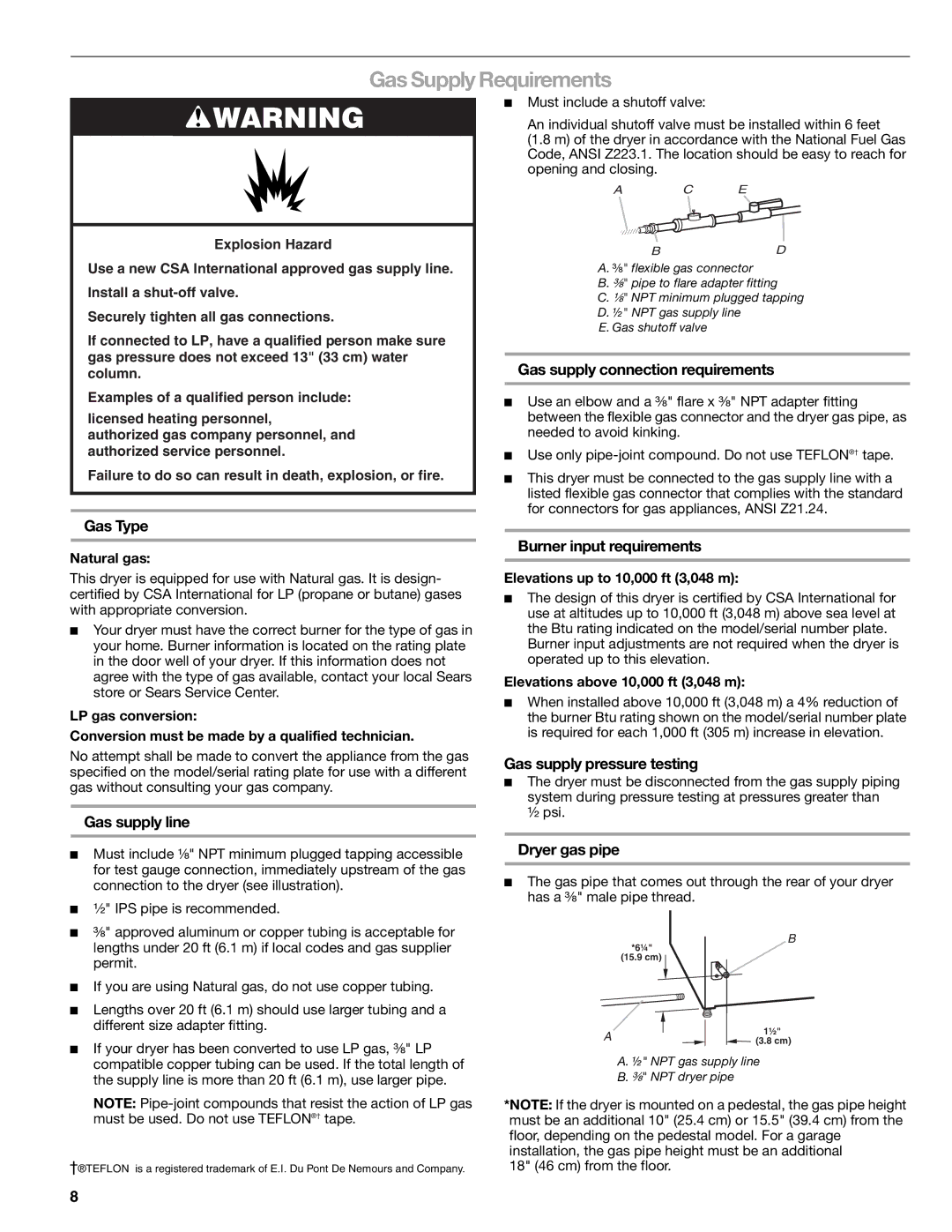
Gas Supply Requirements
![]() WARNING
WARNING
Explosion Hazard
Use a new CSA International approved gas supply line.
Install a
Securely tighten all gas connections.
If connected to LP, have a qualified person make sure gas pressure does not exceed 13" (33 cm) water column.
Examples of a qualified person include:
licensed heating personnel,
authorized gas company personnel, and authorized service personnel.
Failure to do so can result in death, explosion, or fire.
■Must include a shutoff valve:
An individual shutoff valve must be installed within 6 feet
(1.8 m) of the dryer in accordance with the National Fuel Gas Code, ANSI Z223.1. The location should be easy to reach for opening and closing.
AC E
BD
A. ³⁄₈" flexible gas connector
B. ³⁄₈" pipe to flare adapter fitting
C. ¹⁄₈" NPT minimum plugged tapping
D. ½" NPT gas supply line
E. Gas shutoff valve
Gas supply connection requirements
■Use an elbow and a ³⁄₈" flare x ³⁄₈" NPT adapter fitting between the flexible gas connector and the dryer gas pipe, as needed to avoid kinking.
■Use only
■This dryer must be connected to the gas supply line with a listed flexible gas connector that complies with the standard for connectors for gas appliances, ANSI Z21.24.
Gas Type
Natural gas:
This dryer is equipped for use with Natural gas. It is design- certified by CSA International for LP (propane or butane) gases with appropriate conversion.
■Your dryer must have the correct burner for the type of gas in your home. Burner information is located on the rating plate in the door well of your dryer. If this information does not agree with the type of gas available, contact your local Sears store or Sears Service Center.
LP gas conversion:
Conversion must be made by a qualified technician.
No attempt shall be made to convert the appliance from the gas specified on the model/serial rating plate for use with a different gas without consulting your gas company.
Gas supply line
■Must include ¹⁄₈" NPT minimum plugged tapping accessible for test gauge connection, immediately upstream of the gas connection to the dryer (see illustration).
■¹⁄₂" IPS pipe is recommended.
■³⁄₈" approved aluminum or copper tubing is acceptable for lengths under 20 ft (6.1 m) if local codes and gas supplier permit.
■If you are using Natural gas, do not use copper tubing.
■Lengths over 20 ft (6.1 m) should use larger tubing and a different size adapter fitting.
■If your dryer has been converted to use LP gas, ³⁄₈" LP compatible copper tubing can be used. If the total length of the supply line is more than 20 ft (6.1 m), use larger pipe.
NOTE:
†®TEFLON is a registered trademark of E.I. Du Pont De Nemours and Company.
Burner input requirements
Elevations up to 10,000 ft (3,048 m):
■The design of this dryer is certified by CSA International for use at altitudes up to 10,000 ft (3,048 m) above sea level at the Btu rating indicated on the model/serial number plate.
Burner input adjustments are not required when the dryer is operated up to this elevation.
Elevations above 10,000 ft (3,048 m):
■When installed above 10,000 ft (3,048 m) a 4% reduction of the burner Btu rating shown on the model/serial number plate is required for each 1,000 ft (305 m) increase in elevation.
Gas supply pressure testing
■The dryer must be disconnected from the gas supply piping system during pressure testing at pressures greater than ½ psi.
Dryer gas pipe
■The gas pipe that comes out through the rear of your dryer has a ³⁄₈" male pipe thread.
B
*6¼" (15.9 cm)
A |
| 1½" |
| ||
| (3.8 cm) |
A. ½" NPT gas supply line
B. ³⁄₈" NPT dryer pipe
*NOTE: If the dryer is mounted on a pedestal, the gas pipe height must be an additional 10" (25.4 cm) or 15.5" (39.4 cm) from the floor, depending on the pedestal model. For a garage installation, the gas pipe height must be an additional
18" (46 cm) from the floor.
8
